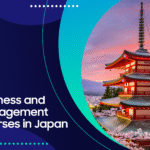Japan has emerged as one of the most sought-after study destinations for Nepali students, seeking a world-class education, cutting-edge technology, and rich cultural experiences. With its reputation for academic excellence, innovative research opportunities, and strong job prospects, studying in Japan offers international students an unparalleled educational journey.
Why Choose Japan for Higher Education?
Japan’s education system consistently ranks among the world’s best, offering international students access to Nobel Prize-winning faculty, state-of-the-art research facilities, and a unique blend of traditional and modern learning approaches. For Nepali students, Japan presents exceptional opportunities in technology, engineering, business, and cultural studies.
Key Benefits of Studying in Japan:
- World-renowned universities with global recognition
- Generous scholarship programs for international students
- Safe and welcoming environment for foreign students
- Strong job market and career opportunities
- Rich cultural heritage and modern lifestyle
- Advanced technology and research facilities
Top Universities in Japan for International Students
1. University of Tokyo (UTokyo)
- Founded: 1877
- Location: Tokyo
- Global Ranking: #23 (QS 2024), #1 in Japan
- Student Body: 28,000+ students (10% international)
The University of Tokyo, commonly known as Todai, represents the pinnacle of Japanese higher education and stands as one of Asia’s most prestigious academic institutions. Established during the Meiji Restoration as Japan’s first modern university, UTokyo has been instrumental in shaping Japan’s modernization and continues to lead the nation’s intellectual development. The university has produced 10 Nobel Prize winners, numerous prime ministers, and countless industry leaders who have defined Japan’s post-war economic miracle.
Located across multiple campuses in Tokyo, UTokyo’s main Hongo campus sits in the heart of Japan’s capital, providing students with unparalleled access to government institutions, international organizations, and major corporations.
Popular Programs for International Students
- PEAK Program (Programs in English at Komaba): Liberal arts and sciences taught entirely in English
- Graduate School of Engineering: Particularly strong in robotics, AI, and environmental engineering
- Graduate School of Economics: Leading program in Asian economic studies and development economics
- School of International Relations: Premier program for diplomacy and international business
- Graduate School of Medicine: Cutting-edge medical research with focus on aging and regenerative medicine
- Graduate School of Information Science and Technology: World-renowned for AI and data science research
Strengths and Advantages
- Comprehensive research ecosystem and unmatched prestige in Asia.
- The largest academic library system in Japan with over 9.7 million volumes, providing students with extraordinary research resources.
- Its faculty includes world-class researchers who regularly publish in top-tier international journals and collaborate with leading institutions globally.
- The PEAK program specifically caters to international students, offering full degree programs in English while providing Japanese language support.
- UTokyo’s location in Tokyo provides internship opportunities with major corporations, government agencies, and international organizations.
- The alumni network spans across politics, business, academia, and international organizations, offering graduates exceptional career prospects both in Japan and internationally.
2. Kyoto University
- Founded: 1897
- Location: Kyoto
- Global Ranking: #46 (QS 2024), #2 in Japan
- Student Body: 22,000+ students (8% international)
Kyoto University stands as Japan’s second-most prestigious institution and arguably its most research-intensive university. Founded during the late Meiji period, Kyodai (as it’s commonly known) has fostered a unique academic culture that emphasizes freedom of research and independent thinking. The university has produced an remarkable 11 Nobel Prize winners – more than any other Asian university – including Shinya Yamanaka for stem cell research and Tasuku Honjo for cancer immunotherapy. This tradition of groundbreaking research continues today across all disciplines.
Situated in Kyoto, Japan’s ancient capital and cultural heart, the university provides students with an extraordinary blend of cutting-edge research and traditional Japanese culture.
Popular Programs for International Students
- Graduate School of Science: World-leading programs in physics, chemistry, and biological sciences
- Graduate School of Engineering: Particularly renowned for materials science, chemical engineering, and architecture
- Graduate School of Medicine: Pioneer in regenerative medicine and cancer research
- Graduate School of Asian and African Area Studies: Unique interdisciplinary programs focusing on developing regions
- Kyoto Institute of Technology Programs: Advanced materials and textile engineering
- Graduate School of Agriculture: Leading research in sustainable agriculture and food security
- Graduate School of Economics: Strong focus on Asian economic development and environmental economics
Strengths and Advantages
- Kyoto University’s greatest asset is its research-first culture that encourages intellectual freedom and innovation.
- The university consistently ranks among the world’s top institutions for research output and impact, particularly in natural sciences and engineering.
- Kyoto’s UNESCO World Heritage status provides an unmatched environment for studying Japanese culture, history, and traditional arts while pursuing cutting-edge research.
- The university’s strong connections with industry, particularly in biotechnology and advanced materials, ensure excellent career prospects for graduates.
3. Osaka University
- Founded: 1931
- Location: Osaka/Suita
- Global Ranking: #68 (QS 2024), #3 in Japan
- Student Body: 23,000+ students (12% international)
Osaka University represents the pinnacle of western Japan’s educational excellence and stands as one of Japan’s most internationally-minded institutions. Born from the merger of Osaka Medical College and Osaka Technical College, Handai (its common name) has grown into a comprehensive research university with a particular strength in fostering international collaboration. The university has produced 5 Nobel Prize winners and maintains Japan’s most diverse international student body, making it an ideal choice for students seeking a global academic environment within Japan.
Strategically located in Japan’s Kansai region, Osaka University benefits from its proximity to Japan’s second-largest metropolitan area. The main Suita campus, situated between Osaka and Kyoto, provides easy access to both cities’ cultural and economic opportunities.
Popular Programs for International Students
- Osaka University Global Science Course (GSC): Undergraduate programs taught entirely in English
- Graduate School of Engineering: Particularly strong in information and computer sciences
- Graduate School of Medicine: Leading research in immunology and cancer treatment
- Graduate School of Economics: Focus on international business and Asian economic integration
- Graduate School of International Public Policy (OSIPP): Premier program for international relations and public policy
- Graduate School of Dentistry: Top-ranked program in dental research and practice
- Graduate School of Human Sciences: Unique interdisciplinary approach to social sciences
Strengths and Advantages
- Osaka University’s primary strength lies in its commitment to internationalization and industry collaboration.
- The university maintains partnerships with over 100 institutions worldwide and offers numerous double-degree programs with leading universities in Asia, Europe, and North America.
- Its strong connections with Kansai region’s major corporations (Panasonic, Sharp, Daikin) provide exceptional internship and employment opportunities.
- The Global Science Course offers a unique undergraduate experience taught entirely in English while providing Japanese language support.
- The university’s location in the Kansai region provides access to a more relaxed, traditional Japanese culture compared to Tokyo, while still offering major city amenities.
4. Tokyo Institute of Technology (Tokyo Tech)
- Founded: 1881
- Location: Tokyo (Ookayama)
- Global Ranking: #91 (QS 2024), #4 in Japan
- Student Body: 10,000+ students (15% international)
Tokyo Institute of Technology stands as Japan’s premier specialized university for science and technology, often called the “MIT of Japan.” Founded during Japan’s rapid industrialization period, Tokyo Tech has been at the forefront of technological innovation for over 140 years. The institute has produced 2 Nobel Prize winners in recent years and consistently ranks among the world’s top engineering schools. Its focused approach on STEM fields allows for unparalleled depth in technological education and research, making it the preferred destination for students passionate about engineering and applied sciences.
The main Ookayama campus is located in central Tokyo, providing students with access to Japan’s technology sector while maintaining a focused academic environment. The campus’s modern facilities include some of Japan’s most advanced research laboratories and the iconic Tokyo Tech Front building. Tokyo’s status as a global technology hub provides internship opportunities with leading tech companies and startups.
Popular Programs for International Students
- International Graduate Program (IGP): Comprehensive graduate programs taught in English
- Computer Science and Engineering: World-class programs in AI, machine learning, and software engineering
- Electrical and Electronic Engineering: Leading research in semiconductors and communication systems
- Mechanical Engineering: Strong focus on robotics, automation, and precision manufacturing
- Materials Science and Engineering: Cutting-edge research in nanotechnology and advanced materials
- Architecture and Building Engineering: Innovative approaches to sustainable design and earthquake engineering
- Chemical Science and Engineering: Excellence in process engineering and materials chemistry
Strengths and Advantages
- Tokyo Tech’s focused STEM approach provides students with unparalleled depth in technological education.
- The institute’s small size (compared to comprehensive universities) ensures close faculty-student relationships and personalized attention.
- Its strong industry connections, particularly with Japanese technology giants like Sony, Honda, and SoftBank, provide exceptional career prospects.
- Research facilities rank among Asia’s best, with access to cutting-edge equipment and ongoing industry-sponsored projects.
- Tokyo Tech’s reputation in industry ensures high employment rates and starting salaries for graduates.
5. Nagoya University
- Founded: 1939
- Location: Nagoya
- Global Ranking: #112 (QS 2024), #5 in Japan
- Student Body: 16,000+ students (11% international)
Nagoya University represents one of Japan’s most remarkable academic success stories, having produced 6 Nobel Prize winners despite being relatively young compared to other imperial universities. Located in Japan’s industrial heartland, Nagoya University has built its reputation on excellence in scientific research and strong industry partnerships. The university’s rapid rise to global prominence reflects its commitment to practical research and innovation, making it particularly attractive to students interested in applied sciences and engineering.
Situated in Nagoya, Japan’s fourth-largest city and industrial center, the university benefits from its location in the Chubu region’s manufacturing hub. Nagoya’s position between Tokyo and Osaka provides access to both major metropolitan areas while offering a more affordable cost of living.
Popular Programs for International Students
- Graduate School of Science: Particularly strong in physics and chemistry, with multiple Nobel laureate faculty
- Graduate School of Engineering: World-renowned automotive engineering programs with Toyota collaboration
- Graduate School of Medicine: Leading research in molecular biology and genetic medicine
- Graduate School of Bioagricultural Sciences: Innovative programs in sustainable agriculture and biotechnology
- Graduate School of Information Science: Growing reputation in data science and computational biology
- Graduate School of Environmental Studies: Unique interdisciplinary approach to sustainability
- Graduate School of Economics: Focus on industrial economics and innovation management
Strengths and Advantages
- Nagoya University’s greatest strength lies in its exceptional research productivity and industry collaboration, particularly in automotive and aerospace engineering.
- The university’s partnership with Toyota provides unique opportunities for automotive engineering students, including access to cutting-edge research facilities and potential employment.
- Its relatively small size ensures close faculty-student relationships and personalized attention.
- The cost of living in Nagoya is significantly lower than Tokyo or Osaka, making it an attractive option for international students.
- The university’s strong performance in producing Nobel Prize winners demonstrates its research excellence, particularly in physics and chemistry.
- Its location in Japan’s industrial heartland provides excellent internship and career opportunities in manufacturing and technology sectors.
6. Tohoku University
- Founded: 1907
- Location: Sendai
- Global Ranking: #79 (QS 2024), #6 in Japan
- Student Body: 18,000+ students (10% international)
Tohoku University holds a special place in Japanese higher education history as the first university in Japan to admit international students (1911) and women (1913), reflecting its progressive and international outlook from its founding. Located in Sendai, the largest city in Japan’s Tohoku region, the university has built a reputation for excellence in materials science, engineering, and disaster prevention research. Following the 2011 tsunami, Tohoku University became a global leader in disaster science and reconstruction studies, attracting international attention and collaboration.
Sendai, known as the “City of Trees,” offers an ideal balance of urban amenities and natural beauty, providing students with a high quality of life at reasonable costs. The city’s location in the Tohoku region places it close to mountains, hot springs, and coastal areas, perfect for students who enjoy outdoor activities. Sendai’s status as a regional hub provides internship opportunities while maintaining a more relaxed atmosphere than Japan’s largest cities.
Popular Programs for International Students
- Future Global Leadership Program (FGL): Interdisciplinary undergraduate program taught in English
- Graduate School of Engineering: Particularly strong in materials science and disaster prevention technology
- Graduate School of Science: Excellence in physics, chemistry, and earth sciences
- International Research Institute of Disaster Science (IRIDeS): World-leading disaster prevention research
- Graduate School of Information Sciences: Growing reputation in AI and data science applications
- Graduate School of Biomedical Engineering: Innovative programs combining engineering and medicine
- Graduate School of Environmental Studies: Focus on sustainable development and environmental protection
Strengths and Advantages of Studying at Tohoku University
- Tohoku University’s pioneering spirit in international education continues today through comprehensive support systems for international students and innovative English-taught programs.
- The university’s strength in materials science research is globally recognized, with faculty regularly publishing in top-tier journals and collaborating with international institutions.
- Its disaster science research, developed after the 2011 tsunami, represents unique expertise available nowhere else in the world.
- The lower cost of living in Sendai makes it an attractive option for international students, while the city’s natural beauty and cultural richness provide an exceptional quality of life.
- Strong government and industry support for Tohoku region reconstruction provides unique research and career opportunities in disaster prevention and sustainable development.
7. Waseda University
- Founded: 1882 | **Private University
- Location: Tokyo
- Student Body: 45,000+ students (13% international)
Waseda University stands as one of Japan’s most prestigious private institutions, known for its liberal academic atmosphere and strong alumni network in politics, business, and media. Founded by former Prime Minister Shigenobu Okuma, Waseda has maintained its reputation for producing leaders in government and industry. Seven Japanese prime ministers are Waseda alumni, along with countless business leaders and cultural figures. The university’s commitment to internationalization and practical education makes it particularly attractive to students seeking global career opportunities.
Located in the heart of Tokyo, Waseda’s main campus provides students with direct access to Japan’s political, business, and cultural centers. The historic main campus in Shinjuku combines traditional architecture with modern facilities, while multiple satellite campuses across Tokyo serve specialized programs. Students benefit from Tokyo’s vibrant cultural scene and extensive transportation network.
Popular Programs for International Students
- School of International Liberal Studies (SILS): Fully English-taught undergraduate program
- Graduate School of International Relations (GSIR): Premier program for diplomacy and international affairs
- Business School: Top-ranked MBA and specialized master’s programs
- Graduate School of Political Science: Leading program in public policy and governance
- School of Science and Engineering: Strong programs in computer science and applied physics
- Graduate School of Journalism: Unique program in media studies and communications
- Graduate School of Asia-Pacific Studies: Focus on regional business and development
Strengths and Advantages of Studying at Waseda University
- Waseda’s greatest strength lies in its extensive alumni network, particularly in the business and government sectors, providing exceptional career opportunities for graduates.
- The School of International Liberal Studies offers a unique undergraduate experience with students from over 50 countries, creating a truly global learning environment.
- Strong industry connections, particularly in finance, consulting, and media, ensure high employment rates and competitive salaries.
- The university’s location in central Tokyo provides access to internships and part-time work opportunities with major corporations.
- Waseda’s liberal academic culture encourages critical thinking and innovation, preparing students for leadership roles in their chosen fields.
8. Keio University
- Founded: 1858 | **Private University
- Location: Tokyo
- Student Body: 33,000+ students (8% international)
Keio University, Japan’s oldest private university, represents the birthplace of modern business education in Japan and maintains its position as the country’s most prestigious private institution. Founded by educator and writer Yukichi Fukuzawa, Keio has produced more CEOs of major Japanese corporations than any other university. The institution’s emphasis on practical learning, entrepreneurship, and global perspective has shaped Japan’s business culture for over 160 years. Keio’s alumni network includes leaders in finance, technology, and international business, making it the preferred choice for students seeking careers in the private sector.
Keio operates multiple campuses across Tokyo and Kanagawa, with the main Mita campus located in central Tokyo near government districts and business centers. Each campus location provides unique advantages, from urban networking opportunities to focused research environments.
Popular Programs for International Students
- Programme in Economics for Alliances, Research and Leadership (PEARL): Undergraduate program taught entirely in English
- Graduate School of International Management: Top-ranked MBA program in Asia
- Graduate School of Economics: Leading program in financial economics and econometrics
- Graduate School of Law: Strong focus on international law and comparative legal studies
- Graduate School of Science and Technology: Innovative programs in information technology and biotechnology
- Graduate School of Media and Governance (SFC): Unique interdisciplinary approach to policy and technology
- Graduate School of Business Administration: Executive education and specialized master’s programs
Strengths and Advantages of Studying at Keio University
- Keio’s unparalleled alumni network in Japanese business provides exceptional career opportunities, with graduates holding leadership positions in major corporations across industries.
- The PEARL program offers international students a comprehensive undergraduate education taught entirely in English while providing access to Keio’s prestigious alumni network.
- Strong industry connections, particularly in finance, consulting, and technology, result in high employment rates and competitive starting salaries.
- The university’s emphasis on practical business education and entrepreneurship prepares students for leadership roles in the global economy.
- Keio’s beautiful campuses and rich traditions create a unique educational experience that combines academic excellence with cultural immersion.
Requirements to Study in Japanese Universities from Nepal
Academic Requirements
For Undergraduate Programs:
- Completion of 12 years of formal education (10+2 or equivalent)
- Some universities require specific subject prerequisites
For Graduate Programs:
- Bachelor’s degree from a recognized institution
- Research proposal (for research-based programs)
- Letters of recommendation
GPA Requirements of Japanese Universities
Top-tier Universities (University of Tokyo, Kyoto University):
- Undergraduate: 3.5+ GPA
- Graduate: 3.7+ GPA
Mid-tier Universities:
- Undergraduate: 3.0 – 3.4 GPA
- Graduate: 3.2 – 3.6 GPA
Private Universities:
- Generally, more flexible with GPA requirements
- Focus on overall application strength
Note: GPA requirements can vary significantly between programs and may be adjusted based on other application components. Please refer to the website of your preferred university for the exact requirements
Language Requirements to Study in Japanese Universities
Japanese Language Programs:
- JLPT (Japanese Language Proficiency Test): N2 or N1 level preferred for most programs
- EJU (Examination for Japanese University Admission): Required for many undergraduate programs
English-Taught Programs:
- TOEFL: Minimum score of 80 – 100 iBT
- IELTS: Minimum score of 6.0 – 7.0
- TOEIC: Some universities accept TOEIC scores (750+ recommended)
Program-Specific Requirements:
- Engineering programs may have lower language requirements
- Liberal arts programs typically require higher proficiency
- Some universities offer preparatory language courses
Application Process and Timeline for Japanese Universities
Step-by-Step Application Guide
- Research and University Selection (12 – 18 months before)
- Research universities and programs thoroughly
- Contact current students or alumni for insights
- Attend education fairs and information sessions
- Language Preparation (12 – 24 months before)
- Begin Japanese or English language preparation
- Take the required standardized tests
- Document Preparation (6 – 12 months before)
- Transcripts and certificates
- Letters of recommendation
- Statement of purpose
- Research proposals (for graduate programs)
- Application Submission
- Most universities have application deadlines between November and February
- Some programs offer multiple intake periods
- Apply for scholarships simultaneously
- Visa Application Process
- Certificate of Eligibility (COE) from the university
- Student visa application submission at the Japanese embassy/consulate through VFS Global Nepal.
Application Timeline for Nepali Students
April Intake (Main Intake):
- Applications due: October-December (previous year)
- Results announced: January-March
- Visa processing: March-April
September/October Intake:
- Applications due: March-May
- Results announced: June-July
- Visa processing: July-September
Career Prospects and Post-Graduation Opportunities in Japan for International Students
Job Market for International Graduates
Japan’s aging population and labor shortage create excellent opportunities for international graduates:
High-Demand Sectors:
- Information Technology and Software Development
- Engineering and Manufacturing
- Healthcare and Pharmaceuticals
- International Business and Trade
- Education and Language Services
Work Visa and Permanent Residency
Skilled Worker Visa:
- Available for university graduates
- Renewable and can lead to permanent residency
- Points-based system favors young, educated professionals
Path to Permanent Residency:
- Typically available after 5-10 years of residence
- Shorter periods are possible through a points-based system
- Japan increasingly welcomes skilled foreign workers
Conclusion
Studying in Japan offers Nepali students an extraordinary opportunity to gain a world-class education while experiencing one of the world’s most fascinating cultures. From the prestigious University of Tokyo to innovative institutes like Tokyo Tech, Japan’s universities provide pathways to successful international careers.
The key to success lies in thorough preparation, understanding requirements, and embracing the cultural learning experience. With proper planning, adequate preparation, and determination, your dream of studying at top universities in Japan can become a reality.
Whether you’re interested in cutting-edge technology, traditional arts, business innovation, or scientific research, Japan’s educational landscape offers programs that can transform your academic and professional future. Start your journey today by researching programs, preparing for language requirements, and connecting with current students and alumni who can guide your path to success.
Remember, studying in Japan is not just about earning a degree – it’s about becoming a global citizen with unique perspectives, valuable skills, and lifelong connections that will benefit your career for decades to come.
Ready to begin your journey to study in Japan? Start by researching specific programs at your chosen universities and begin your language preparation today. Contact Hardford Education today for a detailed counselling on your study journey to Japan. Also, make sure to explore our JLPT preparation classes. The path to your Japanese education adventure starts with a single step.
Frequently Asked Questions – Top Universities in Japan for International Students
- Is it necessary to learn Japanese to study in Japan?
While many universities offer English-taught programs, learning Japanese significantly enhances your experience and career prospects. Most successful international students develop at least conversational Japanese skills during their studies.
- How competitive is admission to top Japanese universities?
Admission to top-tier universities like the University of Tokyo and Kyoto University is highly competitive, with acceptance rates often below 10% for international programs. However, Japan has many excellent universities with more accessible admission requirements.
- Can I work while studying in Japan?
Yes, international students can work up to 28 hours per week with a work permit and up to 40 hours per week during designated long-term holidays, such as summer, winter, and spring breaks. This helps cover living expenses and provides valuable experience with Japanese workplace culture.
- What are the chances of getting a job in Japan after graduation?
Japan actively seeks international talent, especially in STEM fields and business. About 30% of international students find employment in Japan after graduation, with numbers increasing annually.
- How safe is Japan for international students?
Japan is one of the world’s safest countries, with extremely low crime rates. International students consistently report feeling safe and secure throughout their studies.
- Which university is best in Japan for Nepali students?
Top choices for Nepali students include the University of Tokyo, Kyoto University, Osaka University, and Tokyo Institute of Technology. These universities are globally ranked, offer programs in English, and provide scholarships for international students.
- Which city in Japan is best for Nepalese students?
Tokyo, Osaka, and Fukuoka are popular among Nepali students due to quality universities, diverse job opportunities, and vibrant student life. Tokyo offers the best exposure, while Osaka and Fukuoka provide affordable living with strong Nepali communities.
- What GPA is required to study in Japan from Nepal?
Most Japanese universities require at least a 2.5 GPA (on a 4.0 scale) in high school or a Bachelor’s degree. However, competitive programs, especially in top universities, may ask for higher grades and strong entrance exam performance.
- How much does it cost to study in Japan from Nepal?
On average, tuition fees range from ¥500,000 to ¥1,000,000 per year (approx. NPR 4.9 to 9.5 lakhs). Living expenses add ¥70,000 to ¥100,000 per month (NPR 66,800 to 95,500) depending on the city. Scholarships like MEXT or JASSO can significantly reduce costs.
Also Read: Study Engineering in Japan: A Complete Guide for International Students
Master’s in Japan for International Students – A Guide 2026









